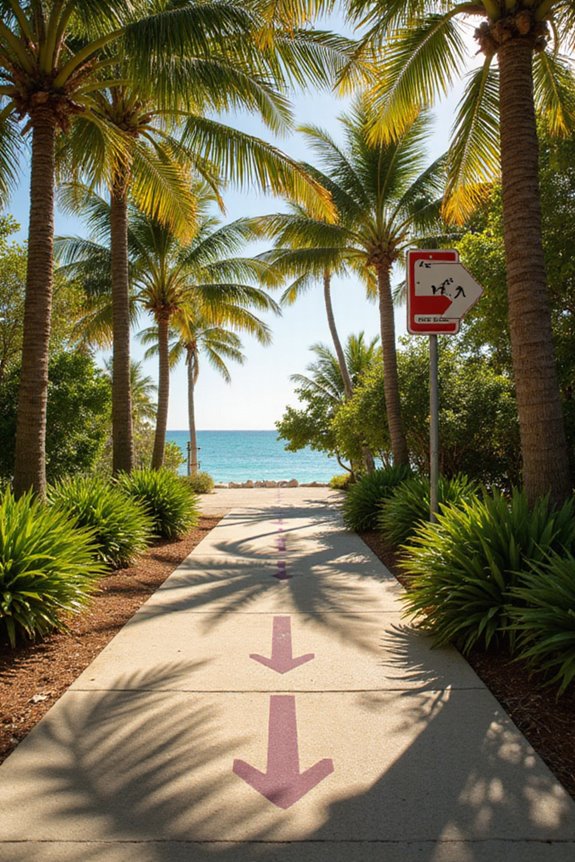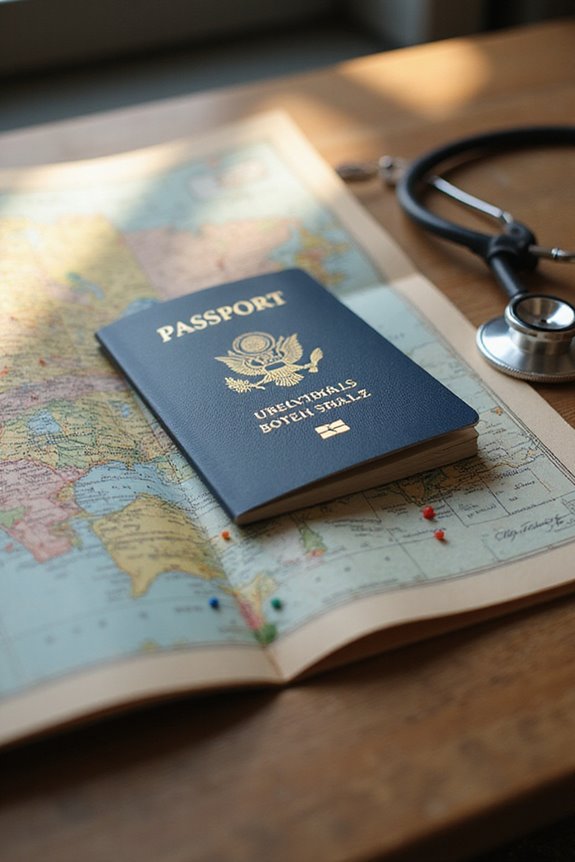When emergencies happen abroad, staying calm is key. First, know what local healthcare looks like—doctors and hospitals might work differently than at home. Always pack sufficient meds and keep them in their original containers to avoid customs hassle. It’s smart to carry your insurance details, as some places need upfront payment. If something goes wrong, assess the situation and call local emergency services. Trust me, knowing these things helps a lot! You might want to keep going to uncover more tips.
Key Takeaways
- Familiarize yourself with local healthcare systems and emergency protocols before traveling to ensure prompt and effective care.
- Keep your insurance information handy and confirm coverage for medical emergencies abroad to avoid unexpected costs.
- In a medical emergency, assess the situation using the ABCDE approach and contact local emergency services for assistance.
- Pack necessary medications in original packaging with a doctor’s note to prevent customs issues and ensure access during your trip.
- After receiving care, obtain medical records and follow up with your primary care physician upon returning home to manage any ongoing issues.
Preparation Before Travel
When you’re gearing up for a trip abroad, it can feel a bit overwhelming, especially when considering the medical side of things. Trust me, I’ve been there! First, check your vaccination records; you don’t want to be stuck without your MMR or tetanus shots, right? Depending on where you’re headed, you might need specific vaccines, like yellow fever. So, see your healthcare provider at least 4–6 weeks before you jet off. Next, think about your medication supplies. Pack enough prescriptions for the trip—and a few extra just in case! Keep them in their original packaging with a doctor’s note, so you don’t run into customs drama. A little prep now can save a lot of headaches later!
Understanding Local Healthcare Systems
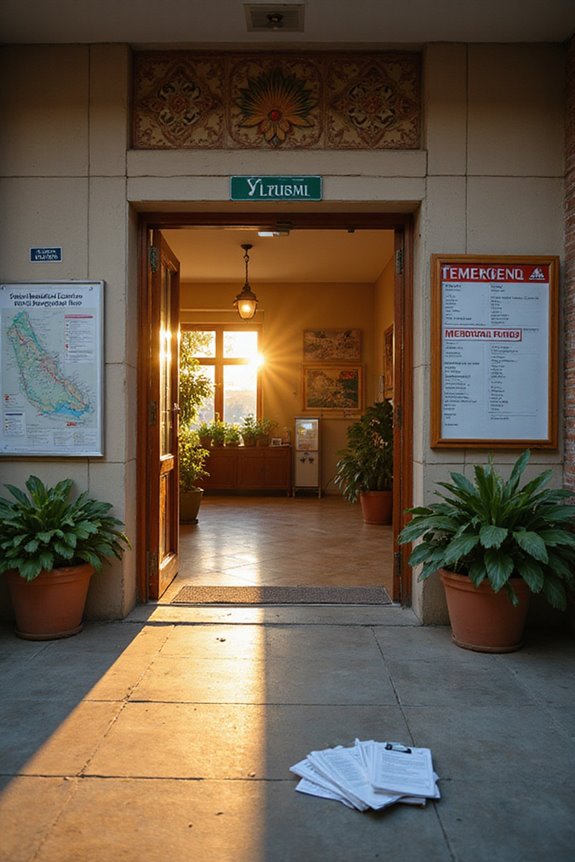
Understanding local healthcare systems can feel like decoding a secret language, especially when you’re in a foreign country, but it doesn’t have to be intimidating. Each country has its unique healthcare models, whether public, private, or a mix of both. For instance, in Brazil, their universal system guarantees everyone—residents and visitors alike—can access care without breaking the bank. Knowing your patient rights is vital too; many places emphasize informed consent and non-discrimination, which is comforting. I remember feeling lost in a hospital, but understanding that emergency care is often assured really eased my worries. So, take a moment to familiarize yourself with local healthcare protocols—it can make all the difference when you need help!
Immediate Response to Medical Emergencies
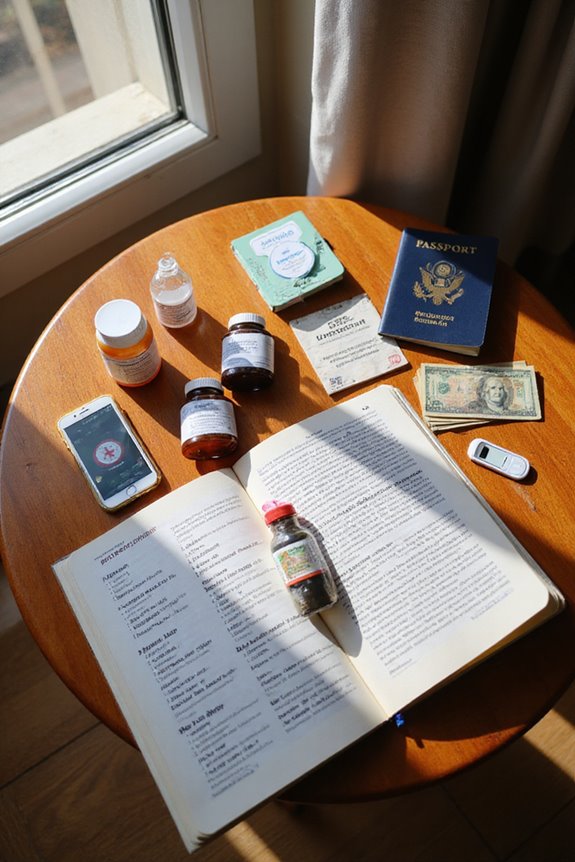
In the blink of an eye, a fun trip can turn into a medical emergency, and trust me, it can feel like you’re living in a movie where the plot twists just keep coming. First things first, you’ve gotta do an emergency evaluation. Look for life-threatening conditions like severe bleeding or difficulty breathing. Prioritize care using the ABCDE approach—airway, breathing, circulation, disability, and exposure. If someone’s in trouble, apply first aid like direct pressure to stop bleeding or CPR if they’re unresponsive. Don’t forget to assess your surroundings for hazards. Call local emergency services, giving them clear info about where you are. Remember, staying calm helps—both you and the patient. It’s all about acting fast and staying focused!
Communication and Assistance
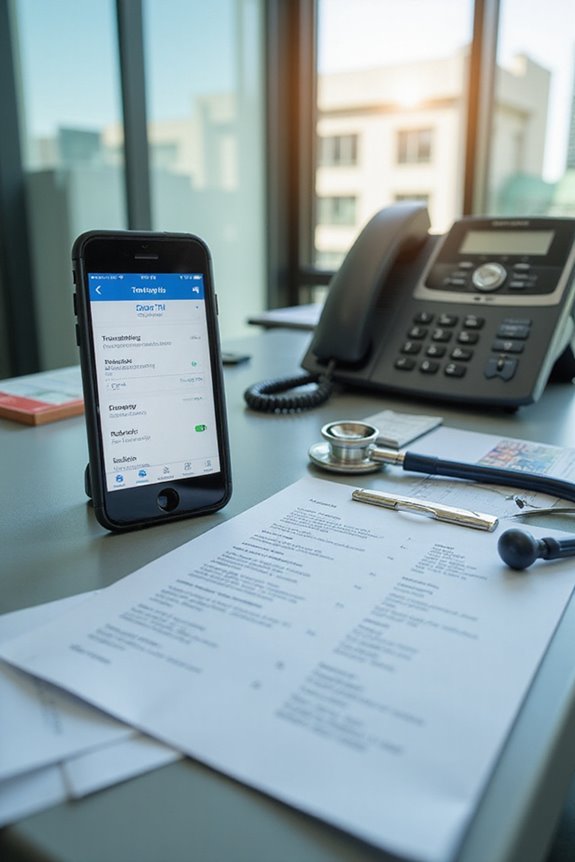
After you’ve tackled the immediate chaos of a medical emergency, the next big hurdle is figuring out how to communicate effectively and get the help you need. Trust me, crisis communication is essential. Before you even set foot in a foreign country, developing a solid communication plan is important. Make sure everyone involved understands the emergency protocols. When the unexpected happens, knowing who to contact can save precious time. I once found myself needing help in a bustling city, and having a list of reputable medical providers was a lifesaver. Using emergency networks and staying adaptable to local conditions can really bridge the gap when you’re in a bind. Remember, clear communication can turn a stressful situation into a manageable one.
Financial and Administrative Considerations

When you’re overseas, the last thing you want to think about is how much a medical emergency might cost, but trust me, it’s essential. I once found myself in a foreign hospital, and the financial documents I had with me felt like a lifeline. Make sure you’ve got your insurance coverage sorted out beforehand; many domestic plans don’t work abroad. I learned that the hard way! Keep your insurance card handy along with emergency contact details, too. Hospitals can ask for payment upfront, which can be intimidating. And remember, ambulance fees vary—some can hit you with a hefty bill. So, prepare yourself financially; it’s better to be safe than sorry when those unexpected moments happen!
Post-Emergency Follow-Up
Once the dust settles after a medical emergency abroad, the focus shifts to what comes next. First, I made sure to grab all my medical records and discharge summaries from the hospital. It’s essential to understand what treatments I received, especially if I need follow-ups. Next, I checked in with local clinics for any necessary visits, ensuring I had a plan for medication management. I double-checked my prescriptions and the local legality of my meds, just to be safe. If side effects popped up, I documented everything for future doctors. Finally, once home, I scheduled a visit with my primary care physician, ready to share my travel experiences, treatments, and any lingering concerns. It’s all about staying on top of my health!
Importance of Travel Medical Insurance
You might think you can skip travel medical insurance, but trust me, it’s one of those things you’ll be grateful for when you find yourself in a foreign hospital, clutching your stomach and wondering if that street food was a bad idea. The travel insurance benefits are essential, covering emergency medical treatment costs that can skyrocket abroad. I’ve heard horror stories of travelers facing huge bills without coverage. Plus, consider the medical coverage options—like emergency evacuation. If you’re in a remote area, you want to know you can get to proper care. Knowing you have protection against unforeseen health issues gives you peace of mind, letting you focus on exploring rather than worrying about your wallet.
Key Phrases for Medical Situations
Managing medical emergencies abroad can feel intimidating, especially if you’re in a country where the language is a mystery. Imagine needing help and struggling to express yourself! That’s why having some key phrases in your back pocket can be a lifesaver. You’ll want to know phrases like “Call an ambulance” and “Where is the hospital?” These help convey urgency and direct you to care. Familiarize yourself with symptom descriptions too—like “I’m feeling faint” or “I have chest pain.” Trust me, knowing how to say “I need a doctor” in the local language can make all the difference. So, practice these medical vocabulary essentials, and don’t forget to save local emergency numbers. It could really save your day!
Resources for Emergency Contacts and Assistance
When you’re traveling, having access to emergency contacts and assistance can feel like a safety net, especially when you’re far from home. I always make sure to download emergency apps before I leave, which can connect me to local contacts in a heartbeat. For instance, if I’m in a pinch, I can reach out to services like International SOS, which has 24/7 support. Plus, it’s vital to have local embassy numbers saved, just in case. I can’t stress enough how important it is to share this information with my travel buddies, so we’re all on the same page. Knowing I’ve got backup can ease my mind and let me enjoy my trip even more!
Frequently Asked Questions
What Should I Do if I Lose My Medications While Traveling?
Imagine losing the compass guiding your journey; that’s how I felt when I lost my medications. I contacted local pharmacy locations for medication replacement, ensuring I navigated through the unfamiliar terrain with confidence.
How Can I Find a Doctor Who Speaks My Language?
Finding a doctor who speaks my language can be tricky due to language barriers. I usually rely on online resources like expat forums and directories to connect with healthcare providers who understand my needs.
What if My Travel Insurance Denies My Claim?
When the tides of travel insurance turn against me, I’ve learned to navigate the stormy seas of claim appeal. Exploring insurance alternatives can be a lifeline, ensuring I stay afloat in unexpected waters.
Are There Specific Vaccines Required for Certain Countries?
When planning my travels, I always check vaccination requirements for my destination. Some countries require specific vaccines, like yellow fever, so I make certain to stay updated on country-specific vaccines to guarantee a smooth trip.
How Can I Prevent Travel-Related Illnesses While Abroad?
When traveling, it’s best to play it safe. I always prioritize travel vaccination and maintain healthy habits like eating cooked foods and drinking bottled water to keep illness at bay. Prevention is key for enjoyable journeys!



